
How to Train Your Cat to Stop Urine Marking
A cat urinating outside the box can be marking behavior, where a cat feels the need to ma...
Cats have a reputation for knocking things off counters and shelves. In fact, a quick search online will bring up many a video and comicstrip about cats breaking things by doing exactly this. This can be frustrating for any cat owner. Why do cats insist on breaking our knickknacks? Well, as with most pet behaviors, there are several different reasons your cat likes knocking things over.
Cats, even indoor only ones, have deeply ingrained predatory instincts. This is because they are considered to be "true" carnivores. In fact, cat toys such as wand toys, laser pointers, and kick sticks are fun for your cat because they are an outlet for these instincts. By knocking your pen around your desk they are trying to determine if the pen is potential prey. Cats will also explore their environment with not just their nose but their paws as well. So even things that don't even remotely look like a mouse or bug might get a perfunctory nudge from your cat.
Cats are smart—a lot smarter than some give them credit for. If cats aren't given proper mental stimulation they can quickly become bored. Many so-called "nuisance" behaviors can arise simply because your cat needs more stimulation. If your cat doesn't get stimulation through active play, he may start tearing up your furniture, climbing your drapes, and playing with things that aren't meant to be cat toys, such as things left laying around on counters.
A cat only needs to knock something off a counter a few times for them to realize that when they knock something over, their owner comes running. If your cat wants attention from you, they may start to knock things off counters to get your attention. In order to not reinforce this behavior, try not to immediately run over when your cat knocks something over. Obviously, if your cat breaks a coffee mug or knocks over a package of food, make sure they don't hurt themselves, but fallen pens and keys can be picked up later.
Since this behavior stems from a natural instinct, it's not recommended to scold your cat for knocking things over. That being said, there are several things you can do to help minimize your cat's destruction by knocking things off counters. Having scheduled play times, especially with toys that utilize their predatory instincts, like wand toys and kick sticks, can help stave off boredom. These toys offer an appropriate outlet for your cat's instincts and provide mental and physical enrichment. Making sure you play with your cat on a regular basis can help break them of their fascination with knocking things off counters. It's important that this playtime is more than just a few minutes, though. Most cats will benefit from 20 minutes of active play each day. In addition to scheduled playtime, redirection can also help. If you see your cat getting ready to jump onto a counter or table that has things on it they may want to knock over, you can distract them with an impromptu play session.
Another way to keep your cat interested in their toys and not your stray pens is toy rotation. It's important to provide your cat with a variety of toys to play with, but it's equally important to rotate those toys so they don't get bored with them. To rotate your cat's toys, you simply need to keep half of them in a plastic storage tote with some dried catnip sprinkled on them. Each week, collect all the toys that are out and swap them for the toys in the storage tote.
Finally, puzzle feeders can be a good tool to utilize as well. If your cat is already knocking things off of your countertops, utilizing puzzle feeders, especially the kind that get knocked around so that the kibble can fall out, can be a good outlet for them. You can also minimize their instinct to knock things over by minimizing their access to things. If you like to keep knickknacks out on display, keep them in an enclosed curio cabinet or on high shelves that your cat can't reach.
You can't stop your cat from instinctively pawing at things. However, if you understand why they are compelled to do so, you can give them appropriate outlets for this behavior.

A cat urinating outside the box can be marking behavior, where a cat feels the need to ma...
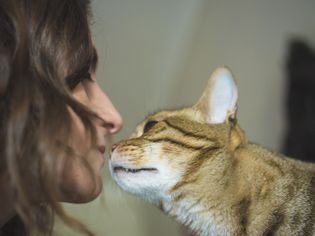
Any cat lovers know that cats, just like dogs, can have some interesting behaviors. Chin ...
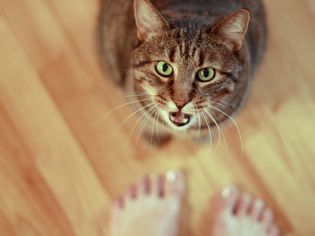
Cats meowing so much can often be misconstrued as a "behavior problem" when it's often co...

If you make it a habit to read the ingredient label before purchasing cat food, ther...
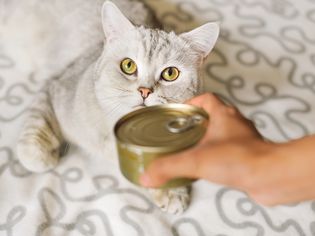
Amino acids are the individual compounds that make up all the proteins in both plants and...
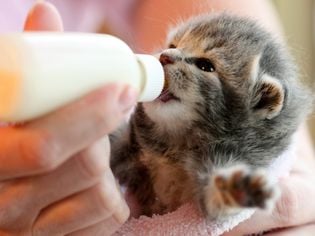
Homemade kitten milk replacer, or formula, is essential for kittens that won't suck, or w...
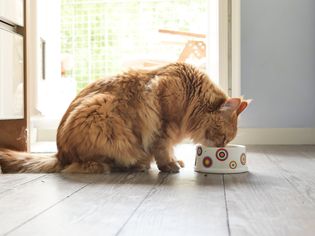
Are raw food diets good for cats? A raw diet requires uncooked animal products instead of...

Many pet stores stock raw or dehydrated treats for dogs, including chicken feet. Some com...

There are two species of roundworms that infect cats; Toxocara cati and Toxascara leonina...
Comments on "Why Do Cats Knock Things Over?" :